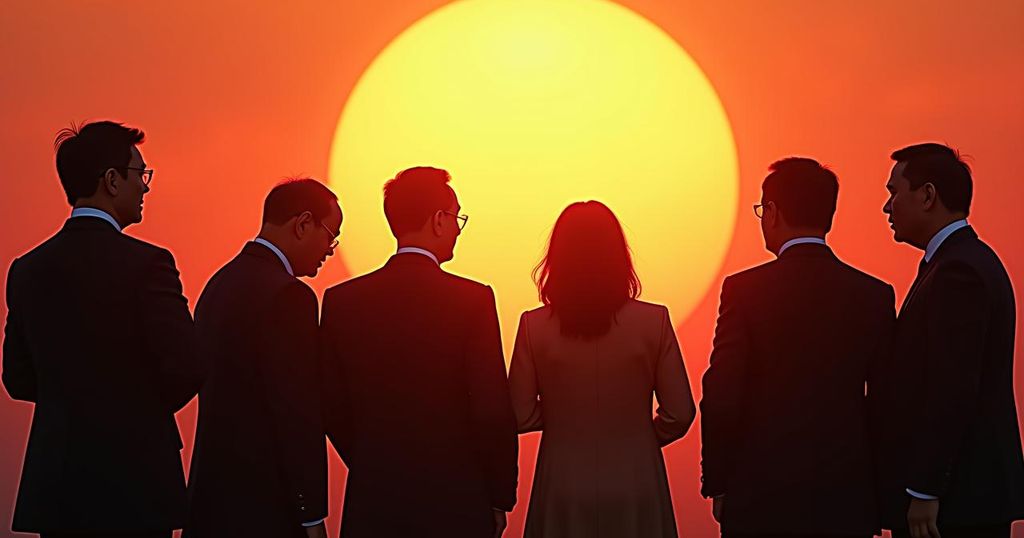ASEAN Leaders Convene in Laos to Address Myanmar Crisis and South China Sea Tensions
Southeast Asian leaders met in Laos for the ASEAN summit, focusing on addressing the civil war in Myanmar and territorial disputes in the South China Sea. The summit also included talks with global powers, highlighting ongoing geopolitical challenges. The participation of Myanmar’s representative raised concerns about ASEAN’s ability to effectively address the crisis. US-China relations and territorial claims in the South China Sea will also be major discussion points.
In Vientiane, Laos, Southeast Asian leaders convened for the annual ASEAN summit, focusing on critical issues such as the protracted civil war in Myanmar and escalating territorial disputes in the South China Sea. The gathering aims to strategize on these persistent challenges that jeopardize the credibility of the Association of Southeast Asian Nations (ASEAN). Following the summit, discussions are planned with global powers including China, the United States, and Russia, who are vying for influence in the region. Despite ASEAN’s historically limited influence, the forum often acts as a platform for dialogue among major powers and regional leaders. The 10 member states, comprising Indonesia, Thailand, Singapore, the Philippines, Vietnam, Malaysia, Myanmar, Cambodia, Brunei, and Laos, will also engage with dialogue partners focusing on vital issues ranging from economic collaboration to climate change. Lao Prime Minister Sonexay Siphandone commenced the summit by welcoming new leaders from Thailand and Singapore, emphasizing Laos’s intent to foster cooperation among ASEAN members while managing geopolitical and economic challenges. Notably, the summit sees a mix of new leadership across member states, including Thailand’s youngest leader, Paetongtarn Shinawatra, and Singapore’s newly appointed Prime Minister, Lawrence Wong. US Secretary of State Antony Blinken will represent the United States, while Premier Li Qiang will represent China. A central concern in these discussions will be the deteriorating US-China relations, especially regarding Beijing’s aggressive posture in the South China Sea, where ongoing territorial disputes involve several ASEAN nations. The situation in Myanmar remains dire, with reports indicating nearly 6,000 fatalities and over 3 million individuals displaced since the military’s ousting of Aung San Suu Kyi’s government. Although Myanmar’s junta has agreed to an ASEAN peace plan, tangible progress has been hampered by ongoing conflicts. Myanmar is represented at the summit by Foreign Ministry permanent secretary Aung Kyaw Moe, marking the first significant attendance by a Myanmar official since ASEAN imposed restrictions on political representation. Concerns regarding ASEAN’s perceived fatigue in handling Myanmar’s crisis were raised, suggesting that prospects for resolution might remain elusive. Overall, while ASEAN faces numerous geopolitical trials, it aspires to utilize this summit to navigate these complexities collaboratively, emphasizing unity and partnership among its members and external allies.
The Association of Southeast Asian Nations (ASEAN) is a political and economic organization comprising ten Southeast Asian countries. Established to facilitate cooperation and promote peace and stability in the region, ASEAN has faced significant challenges, particularly regarding the ongoing civil conflict in Myanmar and territorial disputes in the South China Sea. Myanmar has been embroiled in a crisis since the military coup in February 2021, which has led to widespread violence and political instability. Concurrently, the South China Sea has become a flashpoint of contention among ASEAN countries and China, with overlapping territorial claims exacerbated by China’s aggressive enforcement measures in the area. The summit in Laos serves as a critical platform for member countries to address these issues while seeking to maintain regional solidarity and partnership amid external pressures from major powers.
The ASEAN summit in Vientiane presents an opportunity for Southeast Asian leaders to address pressing issues such as the civil war in Myanmar and tensions in the South China Sea. While challenges to ASEAN’s credibility remain prominent, the organization continues to prioritize dialogue and collaboration among member states and dialogue partners. Discussions will focus on enhancing cooperation, with significant attention dedicated to managing relationships with external powers, particularly as geopolitical tensions escalate.
Original Source: www.arabnews.com




Post Comment